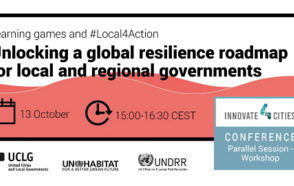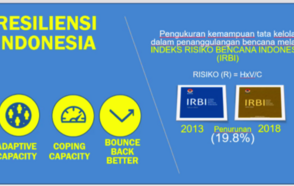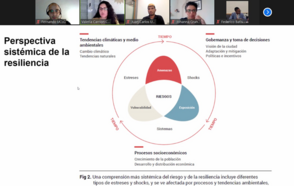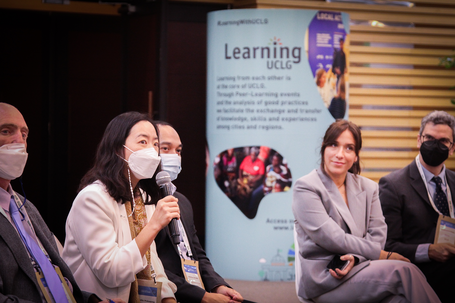
From virtual trainings on urban resilience with Latin American city officers to an online Climate Academy for European politicians, an onsite training in Dibba Al Fujaira (UAE) and field visits in Seoul (South Korea), the Resilience Learning Modules developed by UCLG, UNDRR, and UN-Habitat continue to be rolled-out and adapted throughout the world both digitally and in-person, increasing awareness and enhancing the capacities of local and regional governments towards disaster risk reduction and resilience building.
The effectiveness and ongoing success of the modules was particularly clear during a recent Networking session at UCLG’s World Congress in Daejeon, which highlighted the co-creation process behind this unique learning resource, and the way different partners and members of UCLG have found synergies and increasing demand for the tools and resources available in the Resilience Learning Modules.
“At a recent MCR2030 training in the Maldives led by UNDRR, we met a member of the Local Governments’ Association that had been virtually trained on the modules and was eager to help us with the facilitation of the exercises”, shared Mutarika Pruksapong, Programme Management Officer and Lead Trainer of the United Nations Office for Disaster Risk Reduction (UNDRR). She was referring to Ms Hamdha Abdul Rahman, one of over 300 officers trained so far through trainings led by UCLG-ASPAC’s team, who has further committed to adapting the Futurilities game to include specific challenges and alternatives faced by local governments in her country.
Patricia Mancuello, Coordinator of International Relationships of the Strategic Planning Unit of the city of Buenos Aires and Coordinator of UCLG’s Committee on Urban Strategic Planning, also shared the committee’s experience organizing a training of trainers for Latin American city officers in 2021. “Together with FLACMA, Mercociudades, and CIDEU, we were able to train 38 officers from local governments or their associations in the region, and learn from examples of resilience building actions such as climate adaptation and mitigation in Granollers, ecological restoration in Cuenca, or cultural heritage preservation in La Habana.” The training is being replicated this year with CIDEU, with the collaboration of some of the facilitators trained last year, and will feed a study and publication into the implications of resilience towards strategic planning in Iberoamerican cities.
Beyond Asia-Pacific and Latin America, two of the regions that spearheaded the cocreation of the Resilience Learning Modules through Peer Learnings in Surabaya (Indonesia), Niteroi (Brazil) and San Jose (Costa Rica), the modules have also served to organize trainings in Europe, the Middle East, as well as with UCLG’s Metropolitan section (read more below).
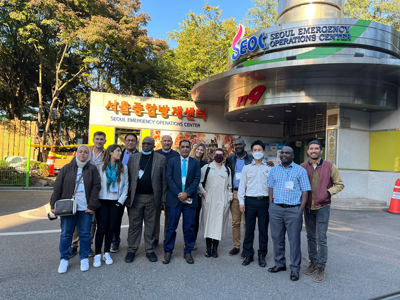 Resilient City Training in Seoul (South Korea)
Resilient City Training in Seoul (South Korea)
Between Oct 17-19, following UCLG’s World Congress in Daejeon, the city of Seoul hosted its first in-person workshop for international participants since the pandemic. The workshop was attended by 10 participants from the over 65 city officers who had completed the online Resilient City Trainings organized in 2021 and 2022 by Seoul’s Human Resource Development Center (SHRDC), together with UCLG and Metropolis. The offline workshop included insightful lectures as well as visits to Seoul’s Metro headquarters, the Seoul Emergency Operations Center, Seoul’s Transport Operation & Information Service, as well as Smart Seoul’s Exhibition Hall. Throughout the three days workshop, participants were able to learn in detail about the smart use of technology by the city to monitor the functioning of its multiple critical systems, respond timely to emergencies, and ensure digital technologies also benefit the elderly and other vulnerable populations.
Training Program on DRR and Resilience for Arab Cities in Dibba Al-Fujairah (UAE)
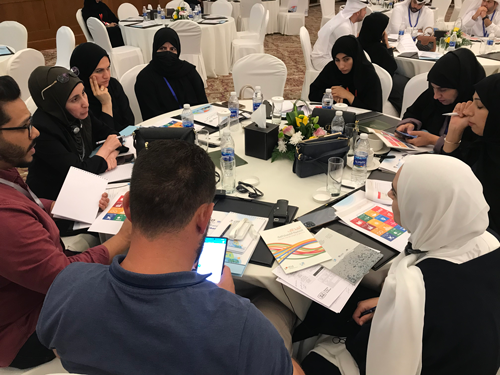 Between Nov 1-2, over 80 participants from 40 Arab cities joined a training program based on the Resilience Learning Module I: Fundamentals of Resilient Governance and Development, recently translated into Arabic by UCLG-MEWA. The training, co-organized by UCLG-MEWA, the Arab Town Organization (ATO), and UNDRR’s Regional Office for Arab States, aimed at increasing the awareness level of municipalities and local administrations on disaster risk reduction strategies; helping cities integrate disaster risk reduction and resilience building into development policies and strategies; and providing city context and region-specific knowledge and tools on disaster risk reduction and urban resilience. Key lessons from the discussions among participants, as well as strategies and actions presented by participating cities and gathered by experts will be soon published as an annex to the Module, providing contextual examples of DRR and resilience-building that can further inspire cities, and facilitate capacity-building efforts across the region.
Between Nov 1-2, over 80 participants from 40 Arab cities joined a training program based on the Resilience Learning Module I: Fundamentals of Resilient Governance and Development, recently translated into Arabic by UCLG-MEWA. The training, co-organized by UCLG-MEWA, the Arab Town Organization (ATO), and UNDRR’s Regional Office for Arab States, aimed at increasing the awareness level of municipalities and local administrations on disaster risk reduction strategies; helping cities integrate disaster risk reduction and resilience building into development policies and strategies; and providing city context and region-specific knowledge and tools on disaster risk reduction and urban resilience. Key lessons from the discussions among participants, as well as strategies and actions presented by participating cities and gathered by experts will be soon published as an annex to the Module, providing contextual examples of DRR and resilience-building that can further inspire cities, and facilitate capacity-building efforts across the region.
Moving forward
The games and slides from the modules have also been extracted and adapted for short sessions and workshops, such as the Cities Talk Nature webinars of the INTERLACE project on Nature-based Solutions, side-events at the World Urban Forum workshop on urban innovation, or sessions on effective disaster response and coordination with the humanitarian sector.
The activities mentioned above show the immense commitment of UCLG members, and also the easy and attractive use of the Resilience Learning Modules. If you are interested or have used the modules in any other events, please contact the learning team via [email protected]!
We welcome further stories to be told, as your progress is our progress and UCLG looks currently on how to move the resilience agenda forward, including the development of new learning material.











